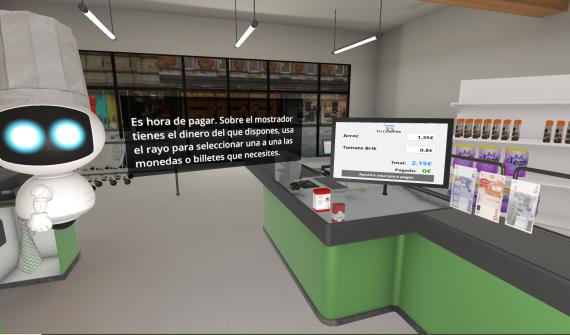Technology for health, virtual reality and rehabilitation combined for Multiple Sclerosis
Multiple Sclerosis (MS) is a chronic neurological disease of the nervous system impacting 47,000 people in Spain with an additional 1,800 cases being reported annually (Spanish Neurological Society). For this population, rehabilitation is a key component for managing symptoms that affect activities of daily living.
Rehabilitation for individuals with MS is typically managed by a multidisciplinary team of therapists and is accompanied by a pharmacological intervention. However, over the past decade, clinicians have become interested in the opportunity for digital technologies – including virtual reality – to improve both the access, and quality of care when used as an adjunct to traditional approaches.
TEVA Virtual Rehab in Neurology (TEVRENE) is a new virtual reality intervention for Multiple Sclerosis developed by Virtualware in collaboration with Teva Pharma and the rehabilitation department at ADEMBI (Biscay Multiple Sclerosis Association). The project has brought together a consortium of healthcare professionals, scientists and software engineers to create a new benchmark in virtual reality rehabilitation for people living with Multiple Sclerosis.
Carlos Teixeira, CEO of Teva Spain and Portugal, summarises the TEVA’s motivation for engaging in this innovative project: “TEVA is committed to provide effective solutions for the MS community, not only exploring and developing efficient treatments, also supporting initiatives based on new technologies for making them to live better.” TEVRENE is a pioneering project that aims to increase the autonomy of patients with MS who engage in rehabilitation; reinforcing their self-esteem, motivation and adherence to the rehabilitation process using gamified feedback and attractive 3D environments. The training content on the system is focused around activities of daily living (ADL) – everyday tasks that can be severely affected by MS, reducing the quality of life and independence.
The VR solution developed by Virtualware, immerses the patient in realistic virtual scenarios using the HTC Vive Virtual Reality headset and peripheral tracking sensors attached to the patients’ hands or wrist. This solution offers several benefits, complementing traditional rehabilitation:
- Additional task-orientated practice for ADL activities
- Feedback systems designed to motivate and improve adherence to high dose rehabilitation
- Executive function rehabilitation activities
- A combination of cognitive and motor challenges
- Adaptive difficulty that can be adjusted to the patient’s ability
- Customisable training programmes and environments
A pilot project testing the feasibility of the system will be starting soon at the ADEMBI rehabilitation centre in Bilbao. The study will recruit 20 participants with the goal of evaluating the system on symptoms of MS. Julio Alvarez, eHealth Business Manager adds “The innovative approach of TEVRENE, will support and improve the quality of life of patients living with MS both now and in the future”


